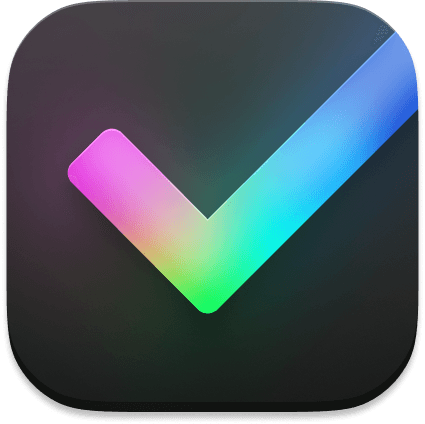Finding time to focus can feel nearly impossible when distractions pile up. That’s where deep work comes in. It helps you carve out uninterrupted time to tackle high-priority tasks with clarity and less stress.
By building habits that support deep work, like time blocking, managing your energy, and setting clear priorities, you can make real progress on what matters most. Tools like Blitzit support this process by helping you organize tasks, stay on schedule, and maintain momentum throughout your day.
Ready to unlock your most productive self? Let’s jump into the strategies and tools that’ll transform the way you work, one focused session at a time.
What Is Deep Work?
Deep work is the practice of focusing completely on a demanding task without distractions for extended periods. This state enables you to push your cognitive boundaries, solve complex problems, and learn new skills efficiently. Coined by Cal Newport, deep work emphasizes achieving peak concentration to produce high-quality results in less time.
When you engage in deep work, your brain operates at its full capacity, making it easier to handle intricate tasks like analyzing data, writing reports, or building strategies. It involves blocking out interruptions and committing to single-tasking so you can reach a state of flow where progress happens naturally and efficiently.
Deep work is different from shallow work, which includes routine or administrative tasks that don’t require deep thinking. By developing habits that support deep focus, you can dramatically increase your productivity and complete your most meaningful work with greater speed and clarity.
Why Deep Work Matters
Focusing deeply on high-impact tasks helps you produce quality results while using your time more effectively. It trains your brain to concentrate, reduces mental clutter, and builds the discipline needed for long-term success.
Benefits of Deep Work
Sharper Focus: Deep work sharpens your ability to concentrate for longer periods, helping you avoid distractions and stay on track.
Higher Output Quality: With full mental engagement, your work is more thoughtful, accurate, and refined.
Faster Skill Development: Learning happens more efficiently when you're fully focused, making it easier to grasp complex ideas and grow professionally.
Improved Creativity: Extended focus unlocks creative thinking, helping you approach problems with fresh ideas.
Greater Career Impact: When you consistently produce high-value results, it sets you apart and opens doors for growth and advancement.
The Cost of Shallow Work
Shallow work, such as excessive communication or low-value tasks, consumes nearly 60% of time for knowledge workers. Distractions erode your ability to engage in high-level work and significantly lower productivity. This time-intensive pattern limits creative problem-solving opportunities.
By focusing instead on strategic tasks, you make room for meaningful effort. Shallow tasks, easy to replicate and of minimal impact, divert attention needed for learning and growth. These inefficiencies can directly hinder professional progress.
Principles Of Deep Work
Deep work relies on a combination of methods to foster sustained focus, improve cognitive performance, and prioritize tasks effectively. Adopting specific strategies helps you maximize your potential and eliminate distractions.
Focused Work Sessions
Schedule uninterrupted blocks dedicated to demanding tasks. Optimal sessions range from 90 to 120 minutes of deep concentration. Techniques such as time blocking and tools like Blitzit make it easier to plan and focus on daily priorities.
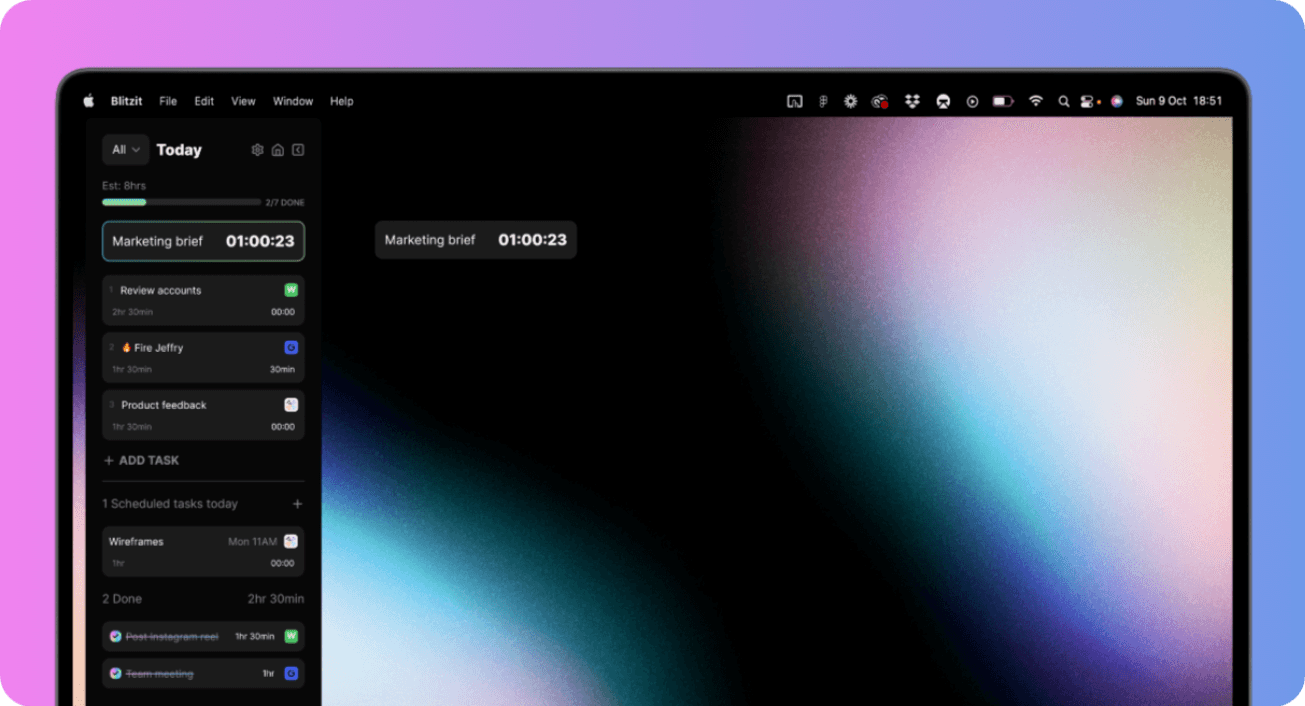
With Blitzit's Focus Panel, you can create a structured workflow where tasks are listed in order of priority, boosting productivity. Using features like a countdown timer ensures you're progressing without interruptions, keeping your efforts directed toward impactful goals.
Eliminate Distractions
Set up an environment conducive to focus by silencing notifications, closing irrelevant tabs, and removing visual clutter. Integrating distraction-free tools such as Blitzit enhances this process by creating a seamless dashboard that keeps your activities aligned.
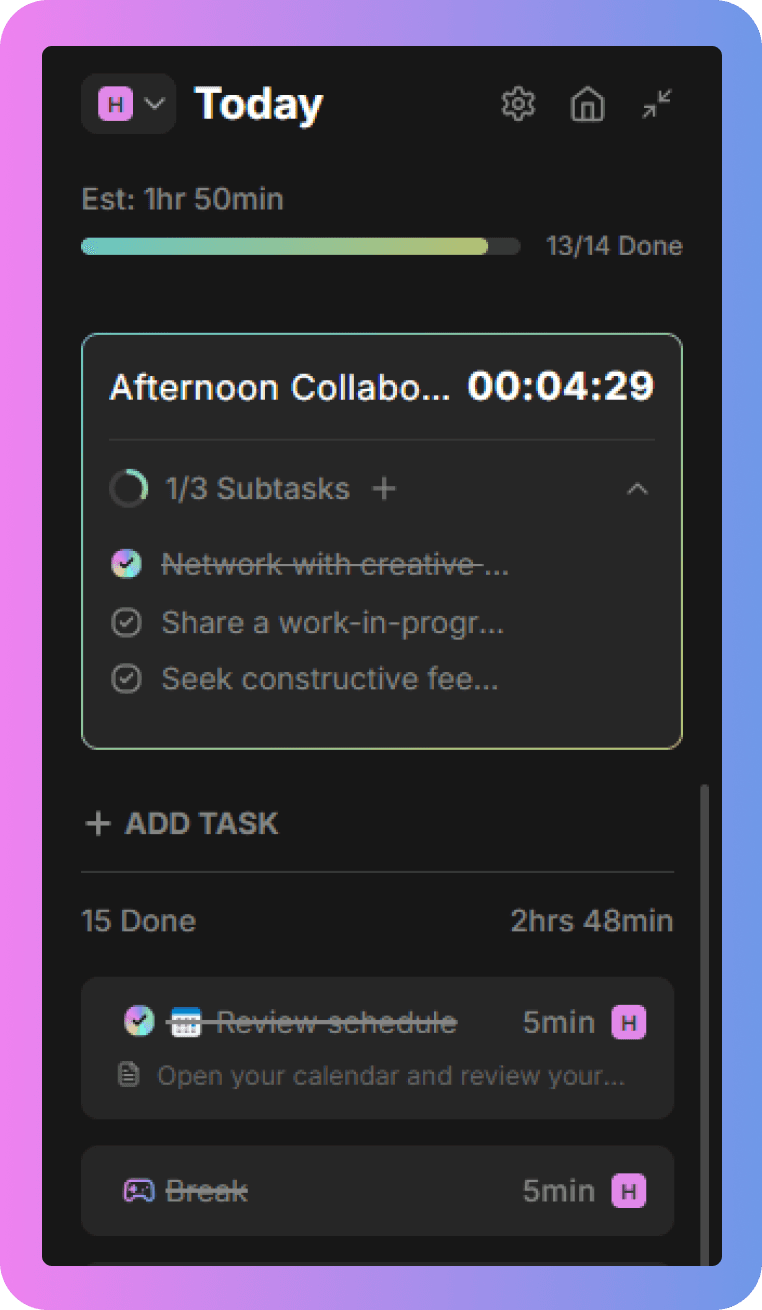
The timer-driven structure helps minimize temptation, ensuring an uninterrupted state of flow. When paired with intentional boundary-setting, it's easier to immerse yourself in tasks, leaving shallow work behind.
Embrace Boredom
Training your mind to tolerate monotony strengthens focus during high-stakes work. Reserving moments of silence, for instance, practicing mindfulness or avoiding over-reliance on quick entertainment like social media, prepares you for intensive deep work sessions.
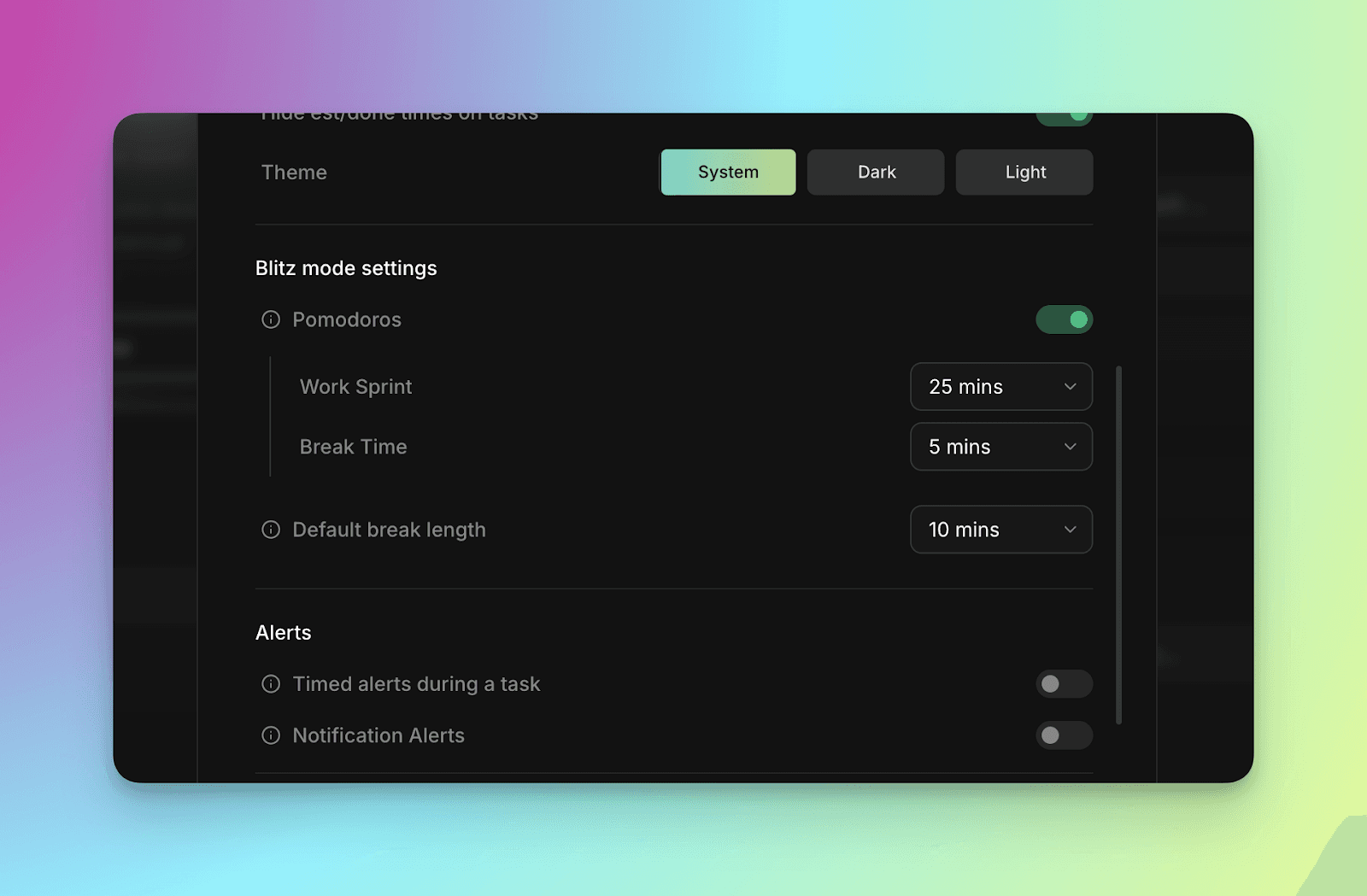
Using functional tools like Blitzit with its Pomodoro-like features allows you to practice balance, alternating between focused work bursts and short breaks. This builds mental endurance for prolonged periods of attention.
Prioritize Meaningful Tasks
Dedicate deep work sessions to high-impact activities aligned with your key objectives. Employ prioritization techniques like the Eisenhower Matrix to sort tasks by urgency and importance. With Blitzit's to-do list, organize your projects visually, scheduling tasks for when you're most alert.
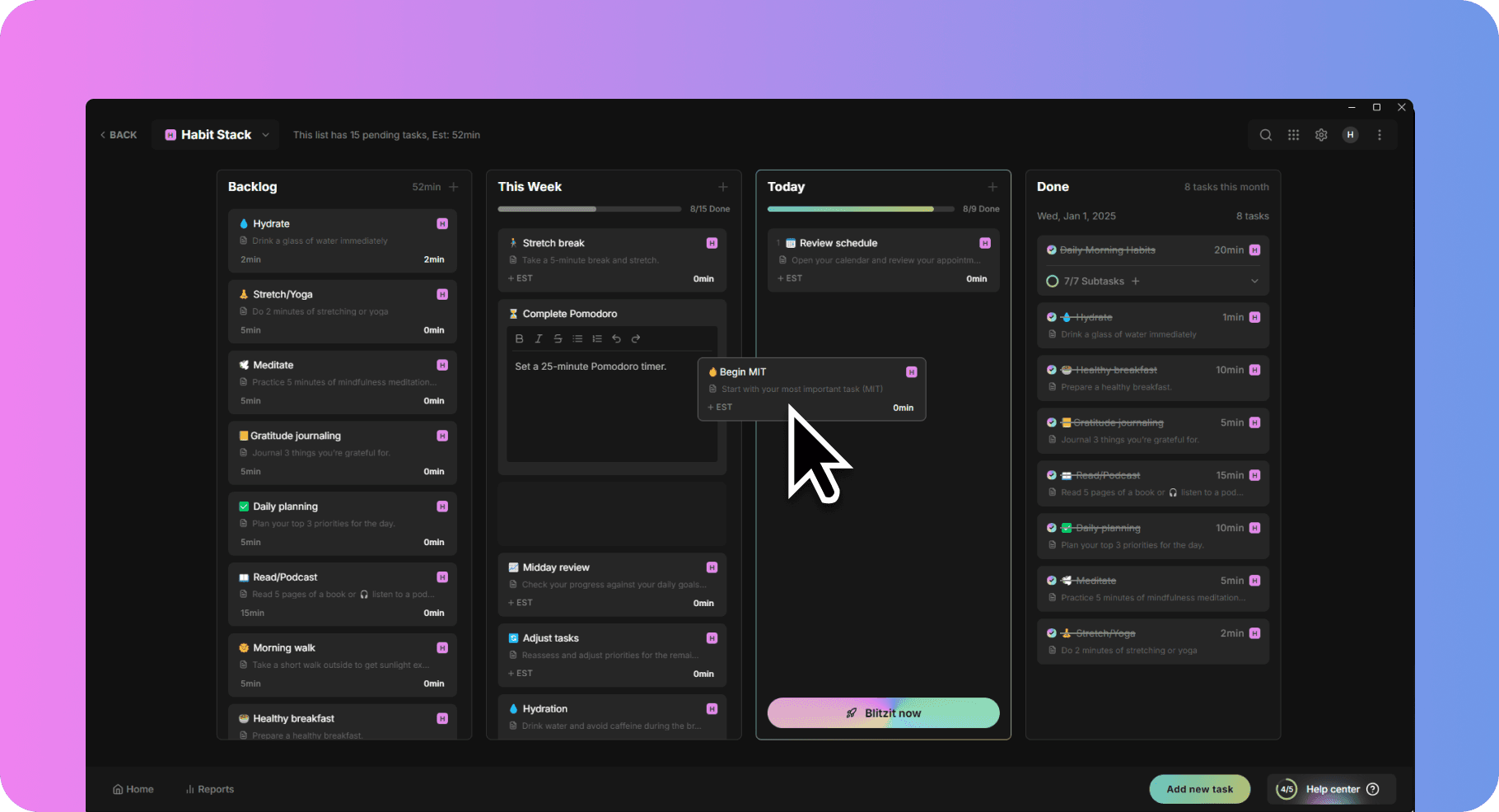
y focusing on these critical assignments and deferring less significant ones, you direct energy toward work that offers the greatest professional or personal value.
Strategies For Achieving Deep Work
Applying proven strategies can help optimize your workflow, eliminate distractions, and boost productivity. Incorporating tools like Blitzit into these practices can strengthen your ability to maintain focus and complete meaningful tasks.
Time Blocking
Structure your day by dividing time into specific blocks dedicated to deep work and other tasks. Allocate longer blocks for cognitively demanding activities, such as analyzing data or writing reports. For example, reserve 9:00 AM to 11:00 AM for deep work and 3:00 PM to 4:00 PM for emails or meetings.
Blitzit’s scheduling feature enhances efficiency by organizing tasks based on priority and order, ensuring you maximize your productive hours. Consistently following this method fosters discipline and prevents multitasking, which disrupts cognitive focus.
Setting Clear Goals
Define your objectives with precision using frameworks like SMART goals or OKRs. Tailor each deep work session to specific outcomes, such as completing a project section or drafting multiple content pieces. This clarity enables you to track progress effectively and reduces procrastination.
Blitzit’s simple-to-do list helps you break down goals into actionable tasks, offering a clear roadmap to success. When you understand the purpose of each task, you engage with greater intent, making each session more impactful.
Environment Optimization
Create a workspace free from distractions to maintain sustained focus. Turn off notifications, declutter your desk, and set up tools that aid concentration. Options like the Monastic or Bimodal environment approaches support an ideal focus state by either isolating distractions entirely or allocating specific times for deep tasks. By aligning your environment with your deep work philosophy, you help the mental clarity needed for impactful work.
Tools To Enhance Deep Work
Efficient tools simplify the process of achieving deep focus by structuring your tasks and minimizing distractions. From leveraging apps to designing an optimized workspace, these solutions make deep work more attainable.
Apps And Technology
Apps designed to block distractions, organize tasks, or track focus time can greatly enhance your deep work sessions. Technologies like Pomodoro timers allow you to concentrate on tasks in manageable intervals. Focus-enhancing apps such as StayFocused help reduce interruptions by limiting access to distracting websites.
Productivity platforms like Blitzit offer features like task prioritization and countdown timers, keeping you aligned with your goals while maintaining a flow state. Also, time trackers provide valuable insights into your productive hours, enabling adjustments that enhance efficiency.
Physical Workspace Essentials
Setting up a workspace that fosters concentration is crucial for deep work. A clutter-free, distraction-free area with essential tools like notebooks and time-keeping devices ensures fewer interruptions.
Noise-canceling headphones or soundproof areas further eliminate disturbances, creating an environment conducive to uninterrupted focus. Consistency in your workspace's layout familiarizes your brain with deep work mode, accelerating the transition into a state of concentration.
Conclusion
Deep work is more than just a productivity trend. It’s a mindset and strategy that helps you work with intention, reduce mental clutter, and produce meaningful results. When you commit to distraction-free focus, you create space for your best work to come through.
Using tools like Blitzit to plan your tasks and manage your time supports this process and helps turn deep work into a repeatable habit. Over time, these focused sessions build momentum, helping you stay productive without feeling overwhelmed. Start small, stay consistent, and let deep work become a part of your daily rhythm.
Finding time to focus can feel nearly impossible when distractions pile up. That’s where deep work comes in. It helps you carve out uninterrupted time to tackle high-priority tasks with clarity and less stress.
By building habits that support deep work, like time blocking, managing your energy, and setting clear priorities, you can make real progress on what matters most. Tools like Blitzit support this process by helping you organize tasks, stay on schedule, and maintain momentum throughout your day.
Ready to unlock your most productive self? Let’s jump into the strategies and tools that’ll transform the way you work, one focused session at a time.
What Is Deep Work?
Deep work is the practice of focusing completely on a demanding task without distractions for extended periods. This state enables you to push your cognitive boundaries, solve complex problems, and learn new skills efficiently. Coined by Cal Newport, deep work emphasizes achieving peak concentration to produce high-quality results in less time.
When you engage in deep work, your brain operates at its full capacity, making it easier to handle intricate tasks like analyzing data, writing reports, or building strategies. It involves blocking out interruptions and committing to single-tasking so you can reach a state of flow where progress happens naturally and efficiently.
Deep work is different from shallow work, which includes routine or administrative tasks that don’t require deep thinking. By developing habits that support deep focus, you can dramatically increase your productivity and complete your most meaningful work with greater speed and clarity.
Why Deep Work Matters
Focusing deeply on high-impact tasks helps you produce quality results while using your time more effectively. It trains your brain to concentrate, reduces mental clutter, and builds the discipline needed for long-term success.
Benefits of Deep Work
Sharper Focus: Deep work sharpens your ability to concentrate for longer periods, helping you avoid distractions and stay on track.
Higher Output Quality: With full mental engagement, your work is more thoughtful, accurate, and refined.
Faster Skill Development: Learning happens more efficiently when you're fully focused, making it easier to grasp complex ideas and grow professionally.
Improved Creativity: Extended focus unlocks creative thinking, helping you approach problems with fresh ideas.
Greater Career Impact: When you consistently produce high-value results, it sets you apart and opens doors for growth and advancement.
The Cost of Shallow Work
Shallow work, such as excessive communication or low-value tasks, consumes nearly 60% of time for knowledge workers. Distractions erode your ability to engage in high-level work and significantly lower productivity. This time-intensive pattern limits creative problem-solving opportunities.
By focusing instead on strategic tasks, you make room for meaningful effort. Shallow tasks, easy to replicate and of minimal impact, divert attention needed for learning and growth. These inefficiencies can directly hinder professional progress.
Principles Of Deep Work
Deep work relies on a combination of methods to foster sustained focus, improve cognitive performance, and prioritize tasks effectively. Adopting specific strategies helps you maximize your potential and eliminate distractions.
Focused Work Sessions
Schedule uninterrupted blocks dedicated to demanding tasks. Optimal sessions range from 90 to 120 minutes of deep concentration. Techniques such as time blocking and tools like Blitzit make it easier to plan and focus on daily priorities.

With Blitzit's Focus Panel, you can create a structured workflow where tasks are listed in order of priority, boosting productivity. Using features like a countdown timer ensures you're progressing without interruptions, keeping your efforts directed toward impactful goals.
Eliminate Distractions
Set up an environment conducive to focus by silencing notifications, closing irrelevant tabs, and removing visual clutter. Integrating distraction-free tools such as Blitzit enhances this process by creating a seamless dashboard that keeps your activities aligned.

The timer-driven structure helps minimize temptation, ensuring an uninterrupted state of flow. When paired with intentional boundary-setting, it's easier to immerse yourself in tasks, leaving shallow work behind.
Embrace Boredom
Training your mind to tolerate monotony strengthens focus during high-stakes work. Reserving moments of silence, for instance, practicing mindfulness or avoiding over-reliance on quick entertainment like social media, prepares you for intensive deep work sessions.

Using functional tools like Blitzit with its Pomodoro-like features allows you to practice balance, alternating between focused work bursts and short breaks. This builds mental endurance for prolonged periods of attention.
Prioritize Meaningful Tasks
Dedicate deep work sessions to high-impact activities aligned with your key objectives. Employ prioritization techniques like the Eisenhower Matrix to sort tasks by urgency and importance. With Blitzit's to-do list, organize your projects visually, scheduling tasks for when you're most alert.

y focusing on these critical assignments and deferring less significant ones, you direct energy toward work that offers the greatest professional or personal value.
Strategies For Achieving Deep Work
Applying proven strategies can help optimize your workflow, eliminate distractions, and boost productivity. Incorporating tools like Blitzit into these practices can strengthen your ability to maintain focus and complete meaningful tasks.
Time Blocking
Structure your day by dividing time into specific blocks dedicated to deep work and other tasks. Allocate longer blocks for cognitively demanding activities, such as analyzing data or writing reports. For example, reserve 9:00 AM to 11:00 AM for deep work and 3:00 PM to 4:00 PM for emails or meetings.
Blitzit’s scheduling feature enhances efficiency by organizing tasks based on priority and order, ensuring you maximize your productive hours. Consistently following this method fosters discipline and prevents multitasking, which disrupts cognitive focus.
Setting Clear Goals
Define your objectives with precision using frameworks like SMART goals or OKRs. Tailor each deep work session to specific outcomes, such as completing a project section or drafting multiple content pieces. This clarity enables you to track progress effectively and reduces procrastination.
Blitzit’s simple-to-do list helps you break down goals into actionable tasks, offering a clear roadmap to success. When you understand the purpose of each task, you engage with greater intent, making each session more impactful.
Environment Optimization
Create a workspace free from distractions to maintain sustained focus. Turn off notifications, declutter your desk, and set up tools that aid concentration. Options like the Monastic or Bimodal environment approaches support an ideal focus state by either isolating distractions entirely or allocating specific times for deep tasks. By aligning your environment with your deep work philosophy, you help the mental clarity needed for impactful work.
Tools To Enhance Deep Work
Efficient tools simplify the process of achieving deep focus by structuring your tasks and minimizing distractions. From leveraging apps to designing an optimized workspace, these solutions make deep work more attainable.
Apps And Technology
Apps designed to block distractions, organize tasks, or track focus time can greatly enhance your deep work sessions. Technologies like Pomodoro timers allow you to concentrate on tasks in manageable intervals. Focus-enhancing apps such as StayFocused help reduce interruptions by limiting access to distracting websites.
Productivity platforms like Blitzit offer features like task prioritization and countdown timers, keeping you aligned with your goals while maintaining a flow state. Also, time trackers provide valuable insights into your productive hours, enabling adjustments that enhance efficiency.
Physical Workspace Essentials
Setting up a workspace that fosters concentration is crucial for deep work. A clutter-free, distraction-free area with essential tools like notebooks and time-keeping devices ensures fewer interruptions.
Noise-canceling headphones or soundproof areas further eliminate disturbances, creating an environment conducive to uninterrupted focus. Consistency in your workspace's layout familiarizes your brain with deep work mode, accelerating the transition into a state of concentration.
Conclusion
Deep work is more than just a productivity trend. It’s a mindset and strategy that helps you work with intention, reduce mental clutter, and produce meaningful results. When you commit to distraction-free focus, you create space for your best work to come through.
Using tools like Blitzit to plan your tasks and manage your time supports this process and helps turn deep work into a repeatable habit. Over time, these focused sessions build momentum, helping you stay productive without feeling overwhelmed. Start small, stay consistent, and let deep work become a part of your daily rhythm.
Finding time to focus can feel nearly impossible when distractions pile up. That’s where deep work comes in. It helps you carve out uninterrupted time to tackle high-priority tasks with clarity and less stress.
By building habits that support deep work, like time blocking, managing your energy, and setting clear priorities, you can make real progress on what matters most. Tools like Blitzit support this process by helping you organize tasks, stay on schedule, and maintain momentum throughout your day.
Ready to unlock your most productive self? Let’s jump into the strategies and tools that’ll transform the way you work, one focused session at a time.
What Is Deep Work?
Deep work is the practice of focusing completely on a demanding task without distractions for extended periods. This state enables you to push your cognitive boundaries, solve complex problems, and learn new skills efficiently. Coined by Cal Newport, deep work emphasizes achieving peak concentration to produce high-quality results in less time.
When you engage in deep work, your brain operates at its full capacity, making it easier to handle intricate tasks like analyzing data, writing reports, or building strategies. It involves blocking out interruptions and committing to single-tasking so you can reach a state of flow where progress happens naturally and efficiently.
Deep work is different from shallow work, which includes routine or administrative tasks that don’t require deep thinking. By developing habits that support deep focus, you can dramatically increase your productivity and complete your most meaningful work with greater speed and clarity.
Why Deep Work Matters
Focusing deeply on high-impact tasks helps you produce quality results while using your time more effectively. It trains your brain to concentrate, reduces mental clutter, and builds the discipline needed for long-term success.
Benefits of Deep Work
Sharper Focus: Deep work sharpens your ability to concentrate for longer periods, helping you avoid distractions and stay on track.
Higher Output Quality: With full mental engagement, your work is more thoughtful, accurate, and refined.
Faster Skill Development: Learning happens more efficiently when you're fully focused, making it easier to grasp complex ideas and grow professionally.
Improved Creativity: Extended focus unlocks creative thinking, helping you approach problems with fresh ideas.
Greater Career Impact: When you consistently produce high-value results, it sets you apart and opens doors for growth and advancement.
The Cost of Shallow Work
Shallow work, such as excessive communication or low-value tasks, consumes nearly 60% of time for knowledge workers. Distractions erode your ability to engage in high-level work and significantly lower productivity. This time-intensive pattern limits creative problem-solving opportunities.
By focusing instead on strategic tasks, you make room for meaningful effort. Shallow tasks, easy to replicate and of minimal impact, divert attention needed for learning and growth. These inefficiencies can directly hinder professional progress.
Principles Of Deep Work
Deep work relies on a combination of methods to foster sustained focus, improve cognitive performance, and prioritize tasks effectively. Adopting specific strategies helps you maximize your potential and eliminate distractions.
Focused Work Sessions
Schedule uninterrupted blocks dedicated to demanding tasks. Optimal sessions range from 90 to 120 minutes of deep concentration. Techniques such as time blocking and tools like Blitzit make it easier to plan and focus on daily priorities.

With Blitzit's Focus Panel, you can create a structured workflow where tasks are listed in order of priority, boosting productivity. Using features like a countdown timer ensures you're progressing without interruptions, keeping your efforts directed toward impactful goals.
Eliminate Distractions
Set up an environment conducive to focus by silencing notifications, closing irrelevant tabs, and removing visual clutter. Integrating distraction-free tools such as Blitzit enhances this process by creating a seamless dashboard that keeps your activities aligned.

The timer-driven structure helps minimize temptation, ensuring an uninterrupted state of flow. When paired with intentional boundary-setting, it's easier to immerse yourself in tasks, leaving shallow work behind.
Embrace Boredom
Training your mind to tolerate monotony strengthens focus during high-stakes work. Reserving moments of silence, for instance, practicing mindfulness or avoiding over-reliance on quick entertainment like social media, prepares you for intensive deep work sessions.

Using functional tools like Blitzit with its Pomodoro-like features allows you to practice balance, alternating between focused work bursts and short breaks. This builds mental endurance for prolonged periods of attention.
Prioritize Meaningful Tasks
Dedicate deep work sessions to high-impact activities aligned with your key objectives. Employ prioritization techniques like the Eisenhower Matrix to sort tasks by urgency and importance. With Blitzit's to-do list, organize your projects visually, scheduling tasks for when you're most alert.

y focusing on these critical assignments and deferring less significant ones, you direct energy toward work that offers the greatest professional or personal value.
Strategies For Achieving Deep Work
Applying proven strategies can help optimize your workflow, eliminate distractions, and boost productivity. Incorporating tools like Blitzit into these practices can strengthen your ability to maintain focus and complete meaningful tasks.
Time Blocking
Structure your day by dividing time into specific blocks dedicated to deep work and other tasks. Allocate longer blocks for cognitively demanding activities, such as analyzing data or writing reports. For example, reserve 9:00 AM to 11:00 AM for deep work and 3:00 PM to 4:00 PM for emails or meetings.
Blitzit’s scheduling feature enhances efficiency by organizing tasks based on priority and order, ensuring you maximize your productive hours. Consistently following this method fosters discipline and prevents multitasking, which disrupts cognitive focus.
Setting Clear Goals
Define your objectives with precision using frameworks like SMART goals or OKRs. Tailor each deep work session to specific outcomes, such as completing a project section or drafting multiple content pieces. This clarity enables you to track progress effectively and reduces procrastination.
Blitzit’s simple-to-do list helps you break down goals into actionable tasks, offering a clear roadmap to success. When you understand the purpose of each task, you engage with greater intent, making each session more impactful.
Environment Optimization
Create a workspace free from distractions to maintain sustained focus. Turn off notifications, declutter your desk, and set up tools that aid concentration. Options like the Monastic or Bimodal environment approaches support an ideal focus state by either isolating distractions entirely or allocating specific times for deep tasks. By aligning your environment with your deep work philosophy, you help the mental clarity needed for impactful work.
Tools To Enhance Deep Work
Efficient tools simplify the process of achieving deep focus by structuring your tasks and minimizing distractions. From leveraging apps to designing an optimized workspace, these solutions make deep work more attainable.
Apps And Technology
Apps designed to block distractions, organize tasks, or track focus time can greatly enhance your deep work sessions. Technologies like Pomodoro timers allow you to concentrate on tasks in manageable intervals. Focus-enhancing apps such as StayFocused help reduce interruptions by limiting access to distracting websites.
Productivity platforms like Blitzit offer features like task prioritization and countdown timers, keeping you aligned with your goals while maintaining a flow state. Also, time trackers provide valuable insights into your productive hours, enabling adjustments that enhance efficiency.
Physical Workspace Essentials
Setting up a workspace that fosters concentration is crucial for deep work. A clutter-free, distraction-free area with essential tools like notebooks and time-keeping devices ensures fewer interruptions.
Noise-canceling headphones or soundproof areas further eliminate disturbances, creating an environment conducive to uninterrupted focus. Consistency in your workspace's layout familiarizes your brain with deep work mode, accelerating the transition into a state of concentration.
Conclusion
Deep work is more than just a productivity trend. It’s a mindset and strategy that helps you work with intention, reduce mental clutter, and produce meaningful results. When you commit to distraction-free focus, you create space for your best work to come through.
Using tools like Blitzit to plan your tasks and manage your time supports this process and helps turn deep work into a repeatable habit. Over time, these focused sessions build momentum, helping you stay productive without feeling overwhelmed. Start small, stay consistent, and let deep work become a part of your daily rhythm.

